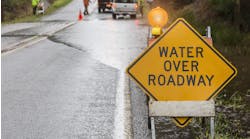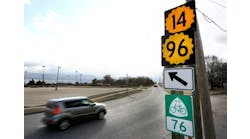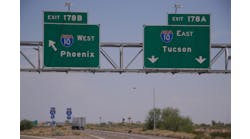Nearly 39% of asphalt pavement mixture produced in 2017 was produced as warm-mix asphalt at reduced temperatures, which decreases energy demands, reduces air emissions, and improves compaction at cooler temperatures, according to the latest survey report from the National Asphalt Pavement Association (NAPA).
The latest survey of asphalt mix producers finds that more than 99% of the asphalt pavement material removed from roads and parking lots in 2017 was put back to productive use, primarily in new asphalt pavement mixtures.
The survey of the U.S. asphalt pavement mixture production industry has been conducted for each construction season since 2009 by NAPA in partnership with the Federal Highway Administration (FHWA). Over the years, the survey has documented increases in the use of recycled materials and warm-mix asphalt.
In 2017, 147.4 million tons of warm-mix asphalt was produced at reduced temperatures—nearly 39% of total asphalt pavement mix production, and a 777% increase since 2009.
The use of warm-mix asphalt had tracked at about a third of all asphalt mixture production since 2013. The increase for 2017 is attributable to an increase in the tons of warm-mix asphalt used by state departments of transportation (DOT). Companies that produce warm-mix asphalt reported that about 42% of the asphalt pavement mixture produced for DOTs was produced at reduced temperatures using warm-mix technologies.
Also, according to the survey, nearly 79 million tons of recycled materials—primarily reclaimed asphalt pavement material (RAP) and recycled asphalt roofing shingles (RAS)—were used in new asphalt pavement mixtures during the 2017 construction season, which was similar to the amount of these materials used in 2016. Ground tire rubber, steel and blast furnace slag, and recycled cellulose fibers were among the other recycled materials used in new asphalt pavements in 2017. The use of RAP and RAS alone resulted in cost savings of more than $2.2 billion compared to the use of virgin materials.
The survey found that more than 76.2 million tons of RAP and nearly 950,000 tons of RAS were used in new asphalt pavement mixes in the U.S. during 2017. An additional 3.9 million tons of RAP and RAS were used as aggregate, in cold-mix asphalt, and other road-building activities.
The survey also found that at year-end 2017 about 103.5 million tons of RAP and RAS was stockpiled for future use across the country. Reclaiming RAP for use in future pavements saved nearly 50 million cu yd of landfill space during 2017.
Although national usage estimates were not calculated, respondents to the survey reported recycling some 1.5 million tons of ground tire rubber, slags, cellulose fiber and other reclaimed and waste materials into nearly 7.5 million tons of asphalt paving mixtures.
----------
Source: NAPA



